小学六年级英语Unit9 You’d better take a taxi.教学设计
鲁教版英语 六年级下册 Unit 9 It's raining! 课后练习题
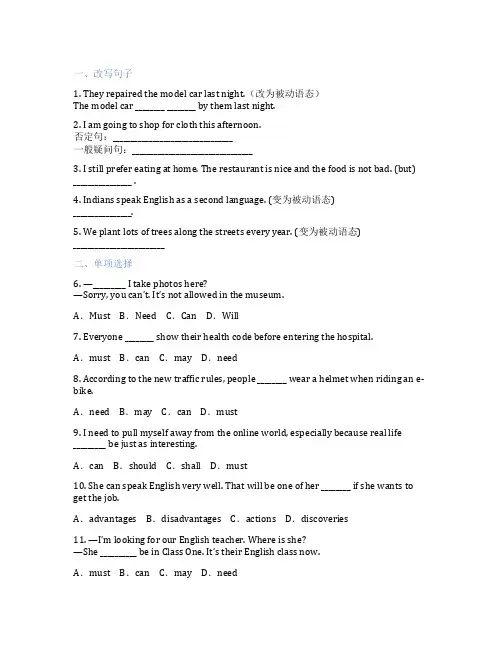
一、改写句子1. They repaired the model car last night.(改为被动语态)The model car ________ ________ by them last night.2. I am going to shop for cloth this afternoon.否定句:_________________________________一般疑问句:_________________________________3. I still prefer eating at home. The restaurant is nice and the food is not bad. (but) ________________ .4. Indians speak English as a second language. (变为被动语态)________________.5. We plant lots of trees along the streets every year. (变为被动语态)_________________________二、单项选择6. —_________ I take photos here?—Sorry, you can’t. It’s not allowed in the museum.A.Must B.Need C.Can D.Will7. Everyone ________ show their health code before entering the hospital.A.must B.can C.may D.need8. According to the new traffic rules, people ________ wear a helmet when riding an e-bike.A.need B.may C.can D.must9. I need to pull myself away from the online world, especially because real life_________ be just as interesting.A.can B.should C.shall D.must10. She can speak English very well. That will be one of her ________ if she wants to get the job.A.advantages B.disadvantages C.actions D.discoveries11. —I’m looking for our English teacher. Where is she?—She __________ be in Class One. It’s their Eng lish class now.A.must B.can C.may D.need12. —Hey, Sandy. Guess where I took this photo.—It ________ be taken in England. I saw the London Eye in it.A.must B.may C.can D.need13. One of the few things you _________ say about English people with certainty is that they talk a lot about the weather.A.need B.must C.should D.can14. You should learn to look after yourself. ________, you are not a child any longer. A.In short B.After all C.At last15. —Give up, okay? I’m losing much hair these days.—Don’t lose heart. There _________ be a good reason for our hard time.A.must B.may C.should D.can三、句型转换16. I can spell this word out, too. (改为否定句)I ________ spell this word out, ________.17. Farmers grow many vegetables in the fields in spring.(变为被动语态)_______________________18. They repaired the model car last night.(改为被动语态)The model car ________ ________ by them last night.19. Could you tell me? How can I deal with all these problems? (合成宾语从句) Could you tell me how ________ ________ deal with all these problems?20. We read English books three times a week. (对画线部分提问)________ ________ ________ you read English books?四、单词拼写21. She is n________ her head to show agreement.22. You ________ ________(应该) throw the rubbish into the garbage.23. ______(再利用) paper is a really easy thing for everyone.24. It is a good habit to r________ water.25. Our drinking water has ________ ________ (用完) already.五、用所给单词的正确形式填空26. We must reach an ________ (agree) at the end of the meeting.27. We should guide the students _____ the survey report (finish).28. Every Chinese must cultivate good ________ (act) when he/she is a student.29. These ________ had some educational visits around our school. (German)30. The company is at a ________ (advantage) because it cannot offer the full range of products.六、完成句子31. Remember to __________ (关掉)all the electricities when you leave the room.32. 别放弃!尽最大的努力,你一定会成功!(give)Don’t ________! Try your best and you’ll succeed.33. 由于考试迫在眉睫,我不得不放弃参加舞蹈演员选拔。
湘少版六年级英语下册第九单元
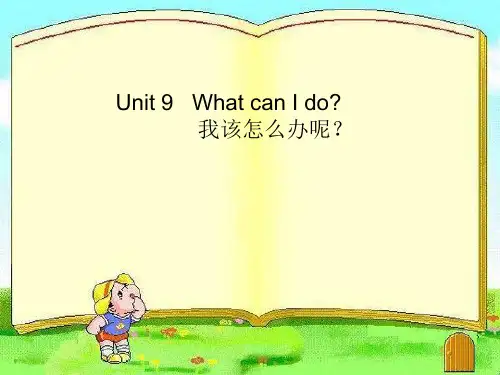
He is going to return the purse to Lingling. A boy walks up to them. She has only one yuan.
Lingling: What can I do? 我该怎么办?
.
Anne:
I’ m sorry, lingling. I only have one yuan.
Lingling : Never mind. I can walk home. 对不起,玲玲。我只有一元钱。 没关系,我可以走回家。
Only: 仅仅,只有; Never mind: 没关系
A boy walks up to them,He is holding lingling’s purse. He returns it to lingling.
5. -- I’m cold. What can I do? -- Put on your clothes.
新单词:
too fat 太胖了 tired 疲劳的 Thirsty 口渴的 ill 生病的 cold 寒冷的
1. I feel sick. what can I do ? You can ( C ). 2.My clothes are dirty.what can I do? You can( B) . 3.I am thirsty. what can I do ? You can ( A )
Analysis of the text 分析课文
Anne and Lingling are coming out of their school. They are running to catch a bus home.
Lesson9 You'd better take a taxi.教后反思
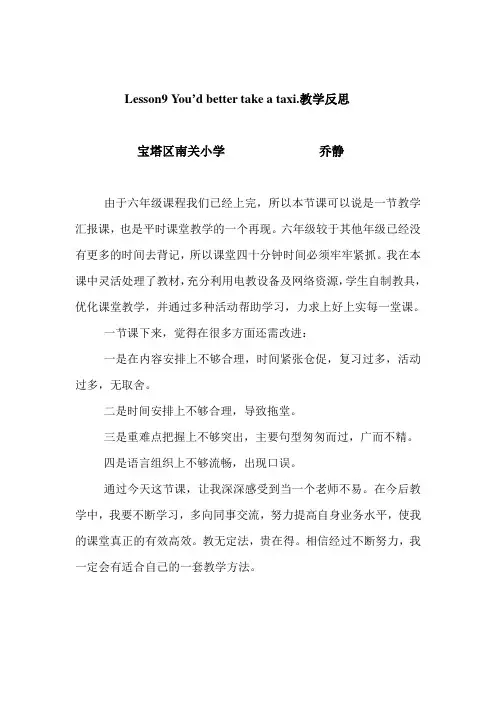
Lesson9You’d better take a taxi.教学反思
宝塔区南关小学乔静
由于六年级课程我们已经上完,所以本节课可以说是一节教学汇报课,也是平时课堂教学的一个再现。
六年级较于其他年级已经没有更多的时间去背记,所以课堂四十分钟时间必须牢牢紧抓。
我在本课中灵活处理了教材,充分利用电教设备及网络资源,学生自制教具,优化课堂教学,并通过多种活动帮助学习,力求上好上实每一堂课。
一节课下来,觉得在很多方面还需改进:
一是在内容安排上不够合理,时间紧张仓促,复习过多,活动过多,无取舍。
二是时间安排上不够合理,导致拖堂。
三是重难点把握上不够突出,主要句型匆匆而过,广而不精。
四是语言组织上不够流畅,出现口误。
通过今天这节课,让我深深感受到当一个老师不易。
在今后教学中,我要不断学习,多向同事交流,努力提高自身业务水平,使我的课堂真正的有效高效。
教无定法,贵在得。
相信经过不断努力,我一定会有适合自己的一套教学方法。
闽教版小学英语六年级上册期末复习材料
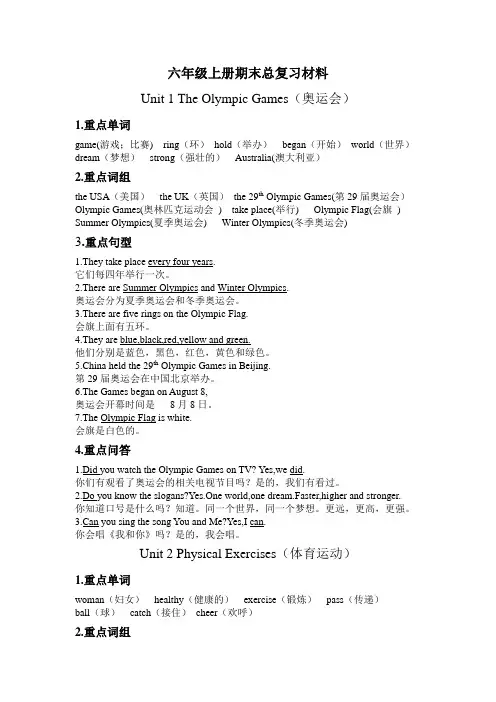
六年级上册期末总复习材料Unit 1 The Olympic Games(奥运会)1.重点单词game(游戏;比赛) ring(环)hold(举办)began(开始)world(世界)dream(梦想)strong(强壮的)Australia(澳大利亚)2.重点词组the USA(美国)the UK(英国)the 29th Olympic Games(第29届奥运会)Olympic Games(奥林匹克运动会) take place(举行) Olympic Flag(会旗) Summer Olympics(夏季奥运会) Winter Olympics(冬季奥运会)3.重点句型1.They take place every four years.它们每四年举行一次。
2.There are Summer Olympics and Winter Olympics.奥运会分为夏季奥运会和冬季奥运会。
3.There are five rings on the Olympic Flag.会旗上面有五环。
4.They are blue,black,red,yellow and green.他们分别是蓝色,黑色,红色,黄色和绿色。
5.China held the 29th Olympic Games in Beijing.第29届奥运会在中国北京举办。
6.The Games began on August 8,___奥运会开幕时间是___8月8日。
7.The Olympic Flag is white.会旗是白色的。
4.重点问答1.Did you watch the Olympic Games on TV? Yes,we did.你们有观看了奥运会的相关电视节目吗?是的,我们有看过。
2.Do you know the slogans?Yes.One world,one dream.Faster,higher and stronger. 你知道口号是什么吗?知道。
六年级下册人教版英语第九课方位词
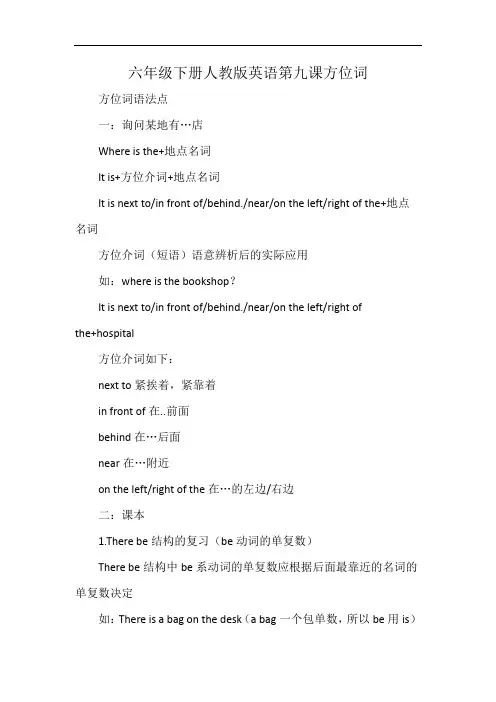
六年级下册人教版英语第九课方位词方位词语法点一:询问某地有…店Where is the+地点名词It is+方位介词+地点名词It is next to/in front of/behind./near/on the left/right of the+地点名词方位介词(短语)语意辨析后的实际应用如:where is the bookshop?It is next to/in front of/behind./near/on the left/right ofthe+hospital方位介词如下:next to紧挨着,紧靠着in front of在..前面behind在…后面near在…附近on the left/right of the在…的左边/右边二:课本1.There be结构的复习(be动词的单复数)There be结构中be系动词的单复数应根据后面最靠近的名词的单复数决定如:There is a bag on the desk(a bag一个包单数,所以be用is)There are two books on the desk(two books两本书,复数,所以be用are)There is a bag and two books on the desk(be动词就近一致原则)2.乘坐交通工具用介词by,但步行时用on3.go to the park前一定要加the,但如果去的地方有具体名字就不能加the,另外go to school是固定搭配,前面也不加the4.how对方式进行提问,本单元询问用哪种交通工具.how do you go to school?I go to school by bus/bike。
I go to school on footHow do you go to…?你怎样到达某个地方?如果要问的是第三人称单数,则要用:How does he/she go to school?do要变成does(与一般现在时单三人称保持一致)回答方式:he/she goes to school bybike/bus/on foot等unit 2 ways to go to school语法点一:how对方式进行提问,我们以前学过how are you?how old are you?how many/how much等问句,本单元着重学习how引导“如何到达某地”如:how do you go to school及其答语的学习,并适当的加入了频度副词--How do you go back home?--I usually go back home by bus二:现实生活中应用这些结构询问某处,指路等1.Where is+地点?询问地点的句型。
广东东莞市初中英语八年级下册Unit 6经典练习卷(课后培优)
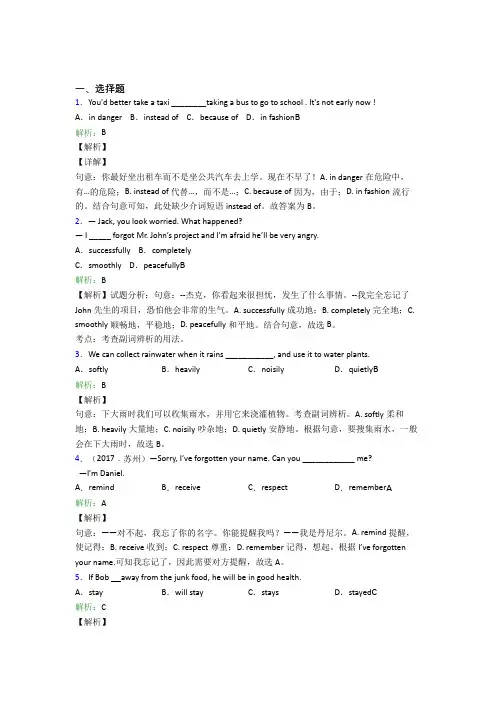
一、选择题1.You'd better take a taxi ________taking a bus to go to school . It's not early now !A.in danger B.instead of C.because of D.in fashion B解析:B【解析】【详解】句意:你最好坐出租车而不是坐公共汽车去上学。
现在不早了!A. in danger在危险中,有…的危险;B. instead of代替…,而不是…;C. because of因为,由于;D. in fashion流行的。
结合句意可知,此处缺少介词短语instead of。
故答案为B。
2.— Jack, you look worried. What happened?—I _____ forgot Mr. John’s project and I’m afraid he’ll be very angry.A.successfully B.completelyC.smoothly D.peacefully B解析:B【解析】试题分析:句意:--杰克,你看起来很担忧,发生了什么事情。
--我完全忘记了John先生的项目,恐怕他会非常的生气。
A. successfully成功地;B. completely完全地;C. smoothly顺畅地,平稳地;D. peacefully和平地。
结合句意,故选B。
考点:考查副词辨析的用法。
3.We can collect rainwater when it rains ___________, and use it to water plants. A.softly B.heavily C.noisily D.quietly B解析:B【解析】句意:下大雨时我们可以收集雨水,并用它来浇灌植物。
考查副词辨析。
A. softly柔和地;B. heavily大量地;C. noisily吵杂地;D. quietly安静地。
北师大版六年级英语下复习Unit9
北师大版六年级英语下复习Unit9Life in the year 2050语法要点:be going to do…与will;so\neither引导的倒装句;much\many\a lot of一、be going to do…与will:be going to与will两者都可表示将要发生的事、将要去做某事,但它们有如下几点差别:1、be going to用以表示某人打算做某事;按计划或安排近期、眼下就要发生的事情;根据主观判断将来绝对发生的事情,含有主观意愿,含有“打算,准备”的意思;如:we are going to help clean up the forest and plant some trees.He is going to write a letter tonight.The railway is going to be open on October 1.这条铁路将于十月一日通车。
2、will用以表示客观上将来势必发生的事情。
叙述某件将要发生之事,在时间上较be going to远一些,而且只是客观的叙述,没有“打算,准备”的意思。
如:You’ll need some work gloves.He will be twenty years old.In the year 2050 life will be very different.I hope robots will wash the dishes.二、so\neither引导的倒装句:英语中习惯用so,neither引导的倒装句,其主语与前一句主语不是同一人,但时态与前句的时态要保持一致。
So表示肯定,So do I = I do too.neither表示否定, Neither do I = I don’t either.1、So+ be/have/助动词/情态动词+主语,表示某人也是如此。
如:I want to live on a farm with horses、cows and chickens. So do I .=I want, too.Mike bought some stamps. So did Bob.=Bob bought some stamps, too.He can swim. So can I.=I can swim, too.他会游泳,我也会。
《开心学英语》六年级上册重点单词词组和句子小结
《开心学英语》六年级上册重点单词词组和句子小结《开心学英语》六年级上册重点单词、词组和句子小结Unit 1: I wrote a long letter.重点单词、词组:1.a piece of candy 一块糖2.a carton of ice cream 一盒冰淇淋3.a pair of socks一双袜子4.a bag of chips一袋薯条5.a bottle of shampoo一瓶洗发水6.a bar of soap一块肥皂7.a box of tissues一盒纸巾8.a roll of toilet paper一卷手纸9.at在10.store商店11.buy(bought)买12.get(got)买到13.have(had)有14.bring(brought)带来15.long长的16.send寄17.idea主意Sounds and words:1.chair椅子2.stairs楼梯3.bear熊4.pear梨5.where哪里6.there那里重点句子:(Target)1.Did you buy a bag of chips at the store?你在商店买了一包薯条吗?Yes, I did.是的,我买了No, I didn’t.不,我没买。
2.I bought a bottle of shampoo.我买了一瓶洗发水。
3.OK. I’ll go to the store and get a bag of chips.我将/准备去商店买一包薯条。
4.I’m going to get a box of tissues, too.我也将/打算买一盒纸巾。
5.I’ll go too. I’m going to get a piece of candy!我也将去。
我将/准备买一块糖!难点句子:(Conversation):1.I wrote a long letter.我写了一封长信。
2021春外研版九年级英语下册Module1Unit1Wetoured
A. on
B. by
C. with D. in
【点拨】介词短语by bus“乘公共汽车”作方式状语。
12. [ 易错题]—I'm __D__ the trip which we can go on whenever
we want to.
—You'll take me, and I'll take the money.
对我们the有m所to帮go助od。u”se.as soon as “一……就…… ”;as
lonAg. aas “soo只n要as”;even though “B.尽as管lo;ng即a使s ”;so that
“C为. 了ev;en目th的ou是gh”。
D. so that
15. [ 中考·江苏徐州] —How is your English going?
thing. What time does the museum close?
A. Can I walk there? B. How far is it from here? C. It’s next to the building of
Dazhou TV station. D. It’s on Jinlong Road. E. It’s opposite the building
of Dazhou TV station. F. Perhaps at 8 p.m. G. How can I get there?
六、完形填空。 I am crazy about traveling abroad. Last year, I took a trip
to Toronto _____26. Those nights, I stayed in a youth hostel (青年旅社).
陕旅版英语六上《Lesson+9+You'd+better+take+a+taxi》教案
Lesson9You’d better take a taxi.教学设计教学目标:1.巩固学习:go down, the traffic lights, the end of the road, achildren`s shop the way to …had better.2、能听懂,会说、会用、会写下列句型:(1)Which is the way to …?(2)Go down this road, and turn left at the traffic lights.Walk on to the end of the road.(3) You`d better …You`d better not …3、通过学习以上词汇及句型的学习,使学生学会与用所学来问路,指路及对他人提出建议。
教学重难点熟练掌握“Which is the way to ”和“You`d better do…句型和祈使句是本课重点也是难点。
教具准备:单词卡,手偶(自制)头饰,PPT教学过程(一)热身活动,创新氛围。
1、齐唱歌曲(Sing a song together):Bingo (欢快的歌曲,将学生带入英语学习乐语)。
PPT2、问候(Greetings):Good morning, boys and girls. I`m sohappy to see you here. Now turn back and say “Hello” tothe teachers. (消除紧张感,增师生感情)3、做游戏(Play a game):Simon says.(二)已旧带新引出新课,并教授句型You`d better …You`d better(not) …1、看地图说路线T: Look at the map, I want to go to the post office?How can I get there?Ss: Go to …,turn left/right, the walk on, it`s on your left/right.You can’t miss it.T: Is it far from here?Ss: Yes, it’s far. You’d better take a taxi.(示图:用建议的语气加上肢体语言让学生理解You`d better do sth. You`d better not sth. 练习变肯定句,否定句。
- 1、下载文档前请自行甄别文档内容的完整性,平台不提供额外的编辑、内容补充、找答案等附加服务。
- 2、"仅部分预览"的文档,不可在线预览部分如存在完整性等问题,可反馈申请退款(可完整预览的文档不适用该条件!)。
- 3、如文档侵犯您的权益,请联系客服反馈,我们会尽快为您处理(人工客服工作时间:9:00-18:30)。
小学六年级英语Unit9 You’d better take a taxi.教学设计
组织教学者:梳洗楼小学赵晶
教学内容:
本课继续学习问路和指路,同时学习对他人做某事提出建议的句型:You’d better …
教学目标:
1.继续学习如何向别人问路并且用祈使句来向别人指路。
2.学习如何向别人表达建议的句型:You’d better…
3.理解会说会用会写以下单词和短语:
Go down , turn left, had better
教学重点和难点分析:
1.比较前面学习的问路的表达方法,掌握用‘Which is the way to …? 句型来问路。
2.理解句型‘You’d better to…’是给别人建议的句型,掌握这个句型的真正用法。
3.将本课所学的表示方向的祈使句与前两课所学的祈使句进行比较学习,学会灵活运用本课的难点。
教学过程:
一.教新单词
1.New teaching.
⑴.Words.
①. the end of the road
拿出一张画有路的图片,向学生询问:
“What is it?”
当学生回答:
“It's road.”
启发学生:“路的尽头用英语怎么表达?”
引出单词:the end of the road
②.a children's shop
拿出一张画商店的图片,向学生询问:
“What is it?”
当学生回答:
“It's shop.”
启发学生:“儿童商店用英语怎么表达?”
引出单词:a children's shop
③:用相同方法教学生学习其它单词。
……
二.讲解课文:
Which is the way to the children's park?
Go down this road,and turn left at the traffic lights.Then walk on to the end of the road.
Is it far from here?
Yes,you'd better take a taxi.It will take you there.
Thanks a lot.
You are welcome.
1.讲解where:(用作疑问代词),在哪里;往哪里;从哪里
2.复习问路的几种句型:
Where is…?
How can I get to …?
3.问路新句型:Which is the way to …?
4.练习用新句型说话。
(给出一些词组:a post office, a hospital,
a children’s park…)
5.重点句型:用来给别人提出建议You’d better …你最好…. You’d better =You had better
否定句:you’d better not…
6.take a taxi与by taxi的用法
三.课堂小结(key points)
1..掌握用Which is the way to …? 句型来问路。
2.用You’d better to…句型给别人提出建议,掌握这个句型的真正用法。
四.布置作业:
1.学写新单词。
2.练习用Which is the way to…?和You’d better to…句型做对话练习。
3背诵课文。
